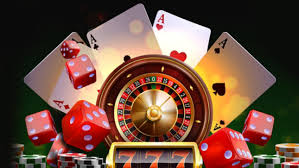
Understanding Why Slots Can Be Addictive
Slot machines have been a staple of casinos for decades, drawing in players with their bright lights, engaging sounds, and the promise of big wins. The addictive nature of these games has been a subject of research and discussion, as many players find themselves unable to stop playing even after experiencing significant losses. One of the popular platforms for accessing these games is the Why Slots Can Be Addictive in Bangladesh joya9 app, which makes it easier than ever to play slots anytime and anywhere. In this article, we will delve into the psychological, emotional, and environmental factors that contribute to the addictive nature of slot machines.
The Allure of the Slot Machines
At first glance, the mechanics of slot machines seem simple: insert money, pull a lever (or press a button), and watch the reels spin. However, the allure of these machines runs much deeper. One primary factor contributing to their attractiveness is the concept of variable reinforcement. This psychological principle suggests that players are more likely to continue engaging with a game when the rewards are unpredictable. Unlike traditional games with fixed outcomes, slots offer the chance of winning at any moment, creating a sense of excitement and anticipation that keeps players coming back for more.
The Role of Instant Gratification
In today’s fast-paced world, instant gratification plays a significant role in our decision-making processes. Slot machines are designed to offer quick rewards, which can lead to feelings of pleasure and satisfaction. This immediate feedback loop triggers the brain’s reward system, releasing dopamine when players win. The more frequently players experience this ‘high’ from winning, the more they may seek it out, often leading to increased playtime and, in some cases, addiction.
Sound and Visual Effects
The vibrant colors, enticing sound effects, and dynamic animations on slot machines are all meticulously crafted to maximize player engagement. When players hit the jackpot or trigger a bonus round, the sounds and visuals enhance the emotional experience, heightening the thrill of playing. This sensory stimulation can create a feedback loop where players associate these positive feelings with the act of playing, further entrenching their desire to play again and again.
The Impact of Near Misses
Research has shown that near misses—when players come close to winning but ultimately do not—can be particularly compelling. These experiences can instigate a strong emotional response, leading players to believe that they are ‘due’ for a win. The brain often interprets these near misses as a signal that victory is within reach, prompting players to continue playing in hopes of finally achieving success. This can significantly contribute to the addictive quality of slot machines.

Social Dynamics in Gambling
Slot machines are often located in bustling environments, with many players around. This social aspect can create a community atmosphere, where individuals feel a sense of camaraderie with fellow gamblers. The sharing of experiences, the excitement of wins, and even the support during losses can reinforce the desire to play. Players may find themselves returning to the machines not only for the game but for the social interactions it brings.
The Role of Accessibility
With the rise of online casinos and mobile applications, like the aforementioned joya9 app, accessing slot machines has never been easier. This increased accessibility can make it more tempting for individuals to play, as they can engage with games from the comfort of their own homes or while on the go. The convenience can diminish the perceived consequences of gambling, potentially leading to more extended play sessions and increased risk of addiction.
Economic Factors and Behavioral Patterns
Many players gamble as a form of entertainment or a way to escape from their daily lives. Economic factors can significantly influence this behavior, especially during challenging financial times when individuals may seek an easy way to improve their situation. Unfortunately, this often leads to problematic gambling habits, as individuals chase losses in hopes of regaining what they have lost. Understanding the economic context in which individuals gamble is crucial for recognizing potential addiction.
Responsible Gambling Practices
While understanding the factors that contribute to the addictive nature of slot machines is essential, it is equally vital for players to practice responsible gambling. Setting limits on both time and money spent on gambling activities can help mitigate the risk of addiction. Players should also be aware of their emotional state when engaging in gambling—playing while stressed or upset can often lead to poor decision-making.
Conclusion
The combination of psychological, emotional, and environmental factors makes slot machines particularly addictive. The thrill of instant gratification, the allure of variable reinforcement, and the sensory experience of playing all contribute to a powerful draw that can be hard to resist. As awareness grows around the addictive nature of these games, the importance of responsible gambling cannot be overstated. Players must prioritize their well-being and recognize when to step back in order to enjoy gambling as a source of entertainment rather than as a route to addiction.